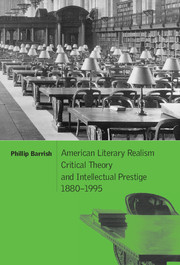Book contents
- Frontmatter
- Contents
- Acknowledgements
- Introduction
- Chapter 1 William Dean Howells and the roots of realist taste
- Chapter 2 The “facts of physical suffering,” the literary intellectual, and The Wings of the Dove
- Chapter 3 The “genuine article”: credit and ethnicity in The Rise of David Levinsky
- Chapter 4 What Nona knows
- Chapter 5 From reality, to materiality, to the real (and back again): the dynamics of distinction on the recent critical scene
- Notes
- Bibliography
- Index
Chapter 5 - From reality, to materiality, to the real (and back again): the dynamics of distinction on the recent critical scene
Published online by Cambridge University Press: 22 September 2009
- Frontmatter
- Contents
- Acknowledgements
- Introduction
- Chapter 1 William Dean Howells and the roots of realist taste
- Chapter 2 The “facts of physical suffering,” the literary intellectual, and The Wings of the Dove
- Chapter 3 The “genuine article”: credit and ethnicity in The Rise of David Levinsky
- Chapter 4 What Nona knows
- Chapter 5 From reality, to materiality, to the real (and back again): the dynamics of distinction on the recent critical scene
- Notes
- Bibliography
- Index
Summary
It is a work of art, first of all, and we think of fine art; though the material will strike many gentilities as coarse and common.
William Dean Howells, Review of Hamlin Garland's Main-Travelled Roads (1890)For many intellectuals, such a politics [as that informing cultural studies] has always been and still is difficult to imagine, let alone accept, because of its necessary engagement with aggressively indifferent attitudes toward the life of the mind and the protocols of knowledge; because it appeals to the body in ways which cannot always be trusted; and because it trades on pleasures which a training in political rationality encourages us to devalue.
Andrew Ross, “New Intellectuals” (concluding section of No Respect: Intellectuals and Popular Culture, 1989)In 1990, the University of Illinois sponsored a conference on cultural studies. As several speakers pointed out, the conference's sheer magnitude, if nothing else, served to announce cultural studies' impressive new status in the US literary academy. That status magnified further over the next several years, as scholarly journals, book series, and additional conferences identified themselves with a cultural studies approach, as did a growing number of graduate student and faculty adherents within literature departments. During the 1990 Illinois conference, audience members paid close attention to a keynote address by Stuart Hall, longtime director of Birmingham's Centre for Contemporary Cultural Studies.
- Type
- Chapter
- Information
- Publisher: Cambridge University PressPrint publication year: 2001



